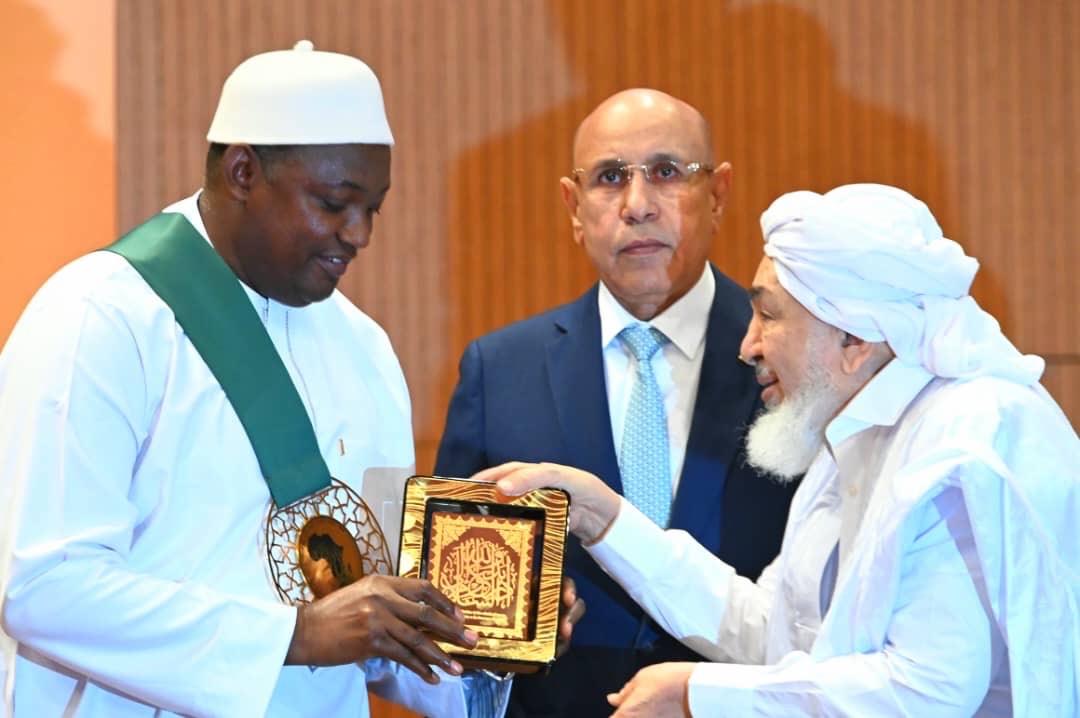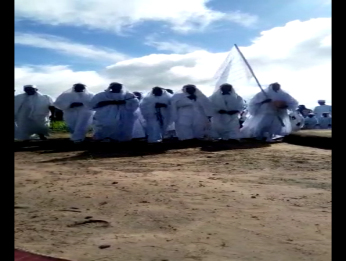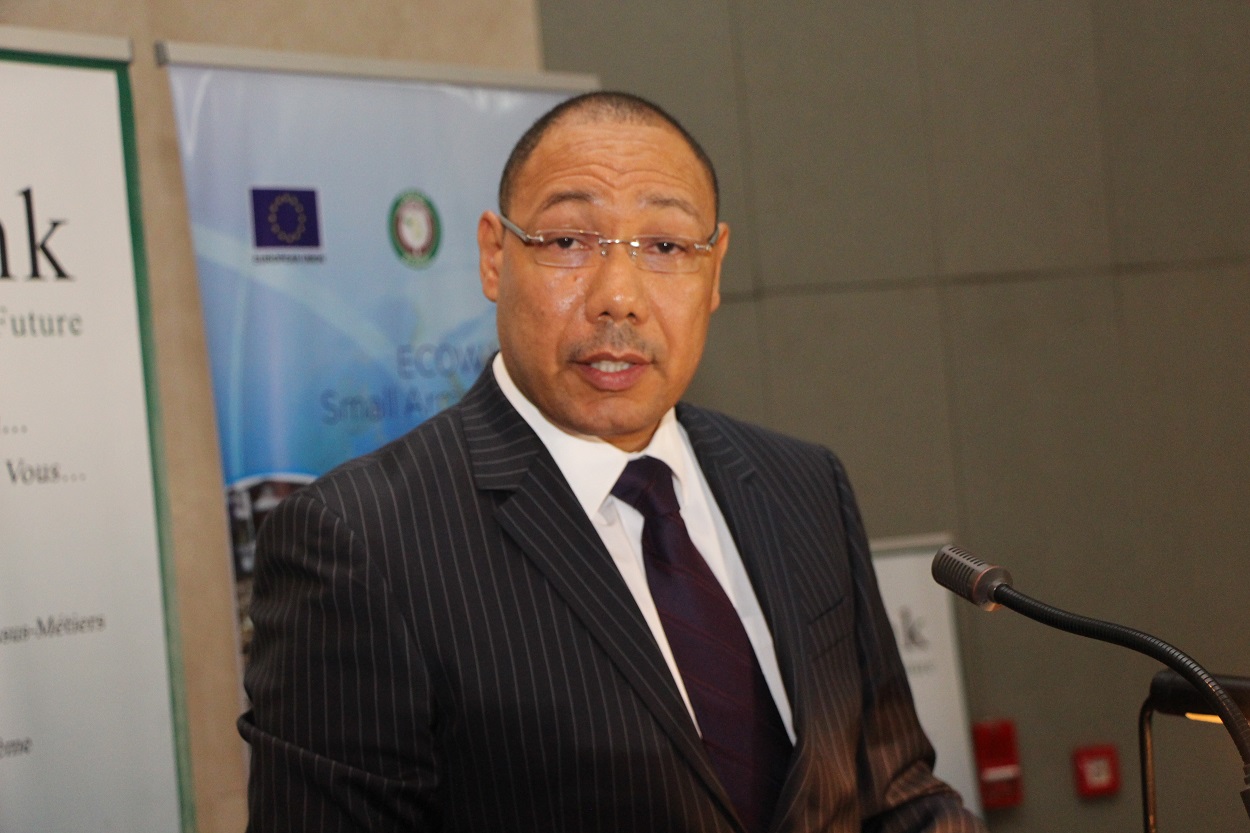By: Sandally Sawo
The Gambian leader Adama Barrow said he has accepted the 2024 African Prize for Peace with humility and a profound sense of gratitude, adding that the award may be in recognition of his “humble” efforts but it also signifies the resilience and commitment of Gambians and Africans to peace promotion, stability and human dignity.
The President made these remarks in his acceptance speech during the 2024 African Peace Award held in Nouakchott, Mauritania from 9-11 January 2024.
“Regardless of the conflicts and suffering across the globe, Africa continues to rise and develop. This resilience demonstrates our unyielding resolve to pursue a durable path to harmony and mutual understanding. Although our history is loaded with challenges, the natural African spirit in us, driven by the ideals of unity and cooperation, remains our guiding light. Consequently, this prestigious peace award is not a mere recognition of efforts but a reminder that the quest for peace is a never-ending venture. It is a journey begun with the sacrifices of our ancestors and sustained by us to ensure a prosperous future for all generations,” Mr. Barrow said.
“For our survival and progress, cultivating a culture of peace is essentially accorded special prominence on our global agenda. Peace in this context goes beyond the absence of conflict; it also embodies the process of fostering understanding, mutual respect, and collaboration among communities and nations,” he added.
President Barrow pointed out that his leadership experience has revealed to him the profound impact of sustained peace on a nation.
“Peace stands out clearly as the bedrock upon which society can heal, economies can thrive, and individuals can access opportunities and enjoy their rights to live happily. Put differently, peace is the cornerstone for a world that upholds human dignity, celebrates diversity, and empowers people to realise their full potential,” he stated, adding: “Excellencies and distinguished delegates, the pursuit of a culture of peace is both a collective and an individual endeavour. It requires policies that directly tackle the root causes of conflict, and these include poverty, inequality, and injustice. This realisation makes it necessary to free all those whose voices are suppressed, especially the advocates of human rights and human dignity.”
Mr. Barrow explained that peacebuilding in Africa calls for addressing emerging threats, such as election-related violence, unregulated migration, abuse of new technologies, and systemic corruption.
“To succeed, as we engage in constructive dialogue and collaboration, we must remember that it is only through collective action that a truly peaceful world order can be established,” he stated.
“Fittingly, therefore, every policy discussion and every act of diplomacy, kindness, and understanding should contribute towards creating a more peaceful, just, and equitable world.”
The Gambian leader said in pursuing his government’s transformation and development agenda in The Gambia, a major focus of the government’s 2018-2021 National Development Plan was to restore and sustain peace and stability through suitable institutional building and people-centred development approaches.
“Furthermore, establishing a Truth, Reconciliation, and Reparation Commission and implementing its recommendations to heal the nation, reforming our Security Sector, and liberating public space for responsible media participation and freedom of expression are important aspects of our peacebuilding story,” he highlighted.
“Constituting a National Human Rights Commission to monitor threats to human rights and addressing them through dialogue, as well as respect for the rule of law and independence of the Judiciary amply demonstrate my government’s commitment to peace, security, and justice,” added Mr. Barrow.
He said: “The Gambia’s inter-linked with the narratives of other African nations, The Gambia’s story remains one of hope and relentless efforts. From nurturing democracy to advocating human rights and fostering economic cooperation, our strides towards peace are steps towards a greater and more united Africa.”
The President said it is conclusive that the African Peace Award is “a call to action for all of us”. “It reminds us that our work is far from over. Thus, in the spirit of African unity, let us recommit ourselves to the principles of the African Union and strive not only to end all conflicts but also to guarantee and sustain development, peace, and prosperity,” he stated.
“Moving forward, our vision must be clear and our determination steadfast sufficiently enough for us to leverage all the strength and courage we can gather, engage the youth and women, and empower every citizen,” stated the Gambian leader.
“Together, we can develop a continent where peace prevails, nations wherein every child grows peacefully, and communities within which each citizen can contribute meaningfully to public life and progress. The road ahead may be rough but if we stand united, our collective resolve will lead to global peace, security, and happiness,” he added.
“I submit that we leave this assembly, not as leaders of diverse nations but as members of a family committed to a brighter future of peace, dignity, and justice for humankind.
“In conclusion, my sincere thanks go to the African Conference for Peace for conferring this huge honour on me. I am also extremely grateful to my fellow Gambians and, by extension, all Africans, whose hopes and dreams I am honoured to represent and promote. Jointly, let us forge ahead for a peaceful, prosperous, and united Africa,” he concluded.





